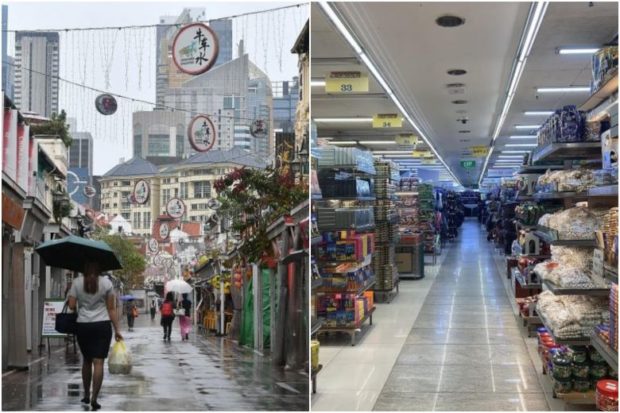Businesses frequented by migrant workers in Singapore’s Chinatown, Little India badly hit by COVID-19

Shops in Pagoda Street (left) have been badly hit by the pandemic, and aisles were empty on Friday at Mustafa Centre, which till recently was a hot 24-hour shopping location. The Straits Times/Asia News Network/LIM YAOHUI, CHERYL TEH
SINGAPORE — Even while retail activity appears to be slowly recovering as the economy reopens, businesses previously frequented by migrant workers in areas like Chinatown and Little India continue to bleed, with workers choosing to shop and eat closer to where they stay instead, causing shops in central areas to shutter as a result.
Checks last week found empty premises and shop owners wondering when things will go back to normal, if ever.
A visit to People’s Park Complex on Wednesday and Friday revealed six to seven units closed on every floor with signs they were for rent. They included a money remittance outlet, two mobile phone and SIM card top-up stores and sundry shops.
Tenants at People’s Park Complex, Hong Lim Complex and other locations in Chinatown said they had been badly hit by the coronavirus pandemic and business had not picked up even after progressive reopening in phases one and two.
“We thought footfall would increase but our customers are mainly migrant workers from China and many of them don’t come by any more,” said Mr Chris Tan, in his 30s, who runs a mobile phone shop at People’s Park Complex.
Article continues after this advertisementA former business owner in his 60s, who wanted to be known only as Mr Wong, told ST he had closed his provision shop in Chinatown after a decade there because it was “too hard to survive”.
Article continues after this advertisement“You can’t do business when there’s no one coming to buy anything. Every day, you bleed money,” said Mr Wong, who said many of his customers were from different parts of China who came for cheap sundries and household products he imported directly from China.
Property agent Victor Han told ST he had seen an “unprecedented” five units in Chinatown being vacated in the last month alone.
“It’s a difficult situation. I’m not sure I can find tenants fast because even with landlords being able to accept slightly lower rents, it’s not like people are lining up to set up physical shops during a pandemic,” Mr Han said.
A check by ST in Little India found that workers are still staying away even if they have been cleared of the virus. The popular Mustafa Centre was close to empty on a weekday night, while grocery stores and food outlets had only one to two customers.
On Aug 27, Mustafa told its workers it was not renewing the contracts of some foreign staff, who would be sent home with a plane ticket and one month’s salary.
“All this produce might end up rotting if it’s unsold,” said Mr Raju Ravichandran, 31, who runs a store selling fruit and vegetables.
He said his stall was once well-patronized by migrant workers, but business had not bounced back to pre-Covid-19 levels. He now counts himself “lucky” if he gets 10 customers a day.
“I’m not sure how long we can stay open if the crowds don’t come back.”
ST also spoke to hawkers and operators of food outlets near Geylang where migrant workers used to go for good, cheap food.
“We now close several hours earlier because we don’t see the crowds that we used to,” said a porridge stall owner in Geylang, who gave her name only as Madam Tong, 68. “We used to have groups of migrant workers come in to eat. It was good business, but because they have been cooped up in the dormitories, we’ve lost that customer base for now.”
But the losses in the central areas have been the gain of small businesses providing similar essential services in heartland areas close to dormitories for migrant workers. These reported a welcome uptick in business with workers choosing to shop nearer the dorms.
Staff at provision shops, food outlets and SIM card shops near dormitories in Kaki Bukit, Tai Seng, Bukit Batok and Jurong East told ST that since announcements last month that migrant workers would be allowed to leave dorms to run errands, business had picked up.
“Some of the workers told me that they would rather go to a store near their dormitories than go all the way to Mustafa Centre or Chinatown, since the prices are comparable and they can find the spices they need at my shop,” said Mr Ramesh Singh, in his 50s, who runs a provision shop in Jurong West. He said his shop has seen a 20 per cent increase in sales to foreign workers, particularly from Bangladesh.
“If I can cater to them and keep my business going, it’s a win-win.”
Migrant worker Xu Yujie, 35, from Guangxi in southern China, told ST he is now patronizing a money remittance service in the Jurong area and buying sundries from neighborhood provision stores near his dormitory, instead of going to Chinatown.
“Even though we can now leave the dormitories for personal errands, I am very afraid of exposing myself to the virus,” he said.
“The main reason for going to Chinatown was to socialize and spend time with friends over a meal, but it will be a long time before we can do that again.”
For more news about the novel coronavirus click here.
What you need to know about Coronavirus.
For more information on COVID-19, call the DOH Hotline: (02) 86517800 local 1149/1150.
The Inquirer Foundation supports our healthcare frontliners and is still accepting cash donations to be deposited at Banco de Oro (BDO) current account #007960018860 or donate through PayMaya using this link.